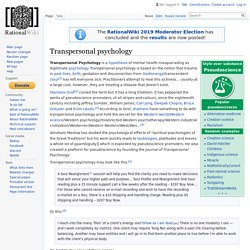

What is Transpersonal Psychology? (with pictures) Transpersonal Consciousness — Exploring your mind. Transpersonal psychology is the only school of psychology that studies the processes that transcend individual identity and the states of consciousness.

Within this framework, people study transpersonal consciousness based on three broad developmental categories: the pre-egoic, the egoic, and the transpersonal or trans-egoic. The latter is considered to be the highest of human potential. Transpersonal psychologist Ken Wilber developed this spectrum model of consciousness. He described it as a process of internal development that leads to transpersonal consciousness. In a nutshell, transpersonal consciousness is a state of mind that allows human beings to be connected and united to their surroundings. Using Wilber’s work as a reference, many transpersonal psychologists study psychopathologies in relation to the patient’s level of transpersonal consciousness (pre-egoic or trans-egoic). List of books and articles about Transpersonal Psychology. Sofia University - Master of Arts in Transpersonal Psychology. The MATP curriculum is designed as a journey that includes scholarship, experiential learning, integration, increased consciousness, transformation, spiritual practices, creative expression, embodiment, and application of transpersonal education in service to the greater communities.

Faculty members facilitate whole-person instruction in a dynamic format within a close learning community. There is a high level of group discussion, participatory learning, and shared experiences. Instructors guide students in setting goals that enable them to make contributions to their families, communities and professional fields. Practicum experiences take place in the student’s home community and are chosen to prepare the student for future professional work or provide new tools for current professional work in their area of Concentration.
Students in the Coaching Concentration will focus on core coaching skills. The Practice of Transpersonal Psychology. Transpersonal psychology. Transpersonal Psychology is a hypothesis of mental health masquerading as legitimate psychology.

Transpersonal psychology is based on the notion that trauma in past lives, birth, gestation and disconnection from God/energy/transcendent/soul[1] has left everyone sick. Practitioners attempt to heal this sickness… usually at a large cost; however, they are treating a disease that doesn't exist. Stanislav Grof[2] coined the term but it has a long tradition; it has peppered the works of pseudoscience promoters, of all stripes and colours, since the eighteenth century including Jeffrey Sumber, William James, Carl Jung, Deepak Chopra, Bruce Greyson and Ervin Laszlo.[3] According to Grof, shamans have something to do with transpersonal psychology and hold the secret for the Western world/Western science/Western psychology/misdirected Western psychotherapy/Western industrial civilization/Westerner/Western Western/West/Wes…[4] Transpersonal psychology may look like this:[5] Or this:[6] Carl Jung[10]
6 Facts About Transpersonal Psychology. In the Foreword of The Textbook of Transpersonal Psychiatry and Psychology, writer Ken Wilber defines “transpersonal” as “personal plus.”

He explains that transpersonal work integrates both personal psychology and psychiatry but then “adds those deeper or higher aspects of human experience that transcend the ordinary and the average—experiences that are, in other words, ‘transpersonal’ or ‘more than personal,’ personal plus.” It turns out that transpersonal psychology focuses on the spiritual. Bruce W. Scotton, M.D., one of the editors of the book, describes “spiritual” as “the realm of the human spirit, that part of humanity that is not limited to bodily experience.” Transpersonal Psychology History and Practice. Transpersonal psychology is a field or school of thought in psychology centered on the spiritual aspects of human life.

The term transpersonal psychology was first introduced in the 1960s by psychologists such as Abraham Maslow and Victor Frankl. This field utilizes psychological methods and theories to examine spiritual subject matter. History The Journal of Transpersonal Psychology began publication in 1969 and in 1971 the Association for Transpersonal Psychology was established. While the field did not formally begin until the late 1960s, it has its roots in early work by psychologists including William James and Carl Jung who were deeply interested in the spiritual aspects of human nature.
Definition Transpersonal psychology is a label for a type of psychological theory that embraces a wide variety of ideas that have nothing to do with religion and everything to do with the mind and behavior. Popularity Difference From Parapsychology Research Areas.